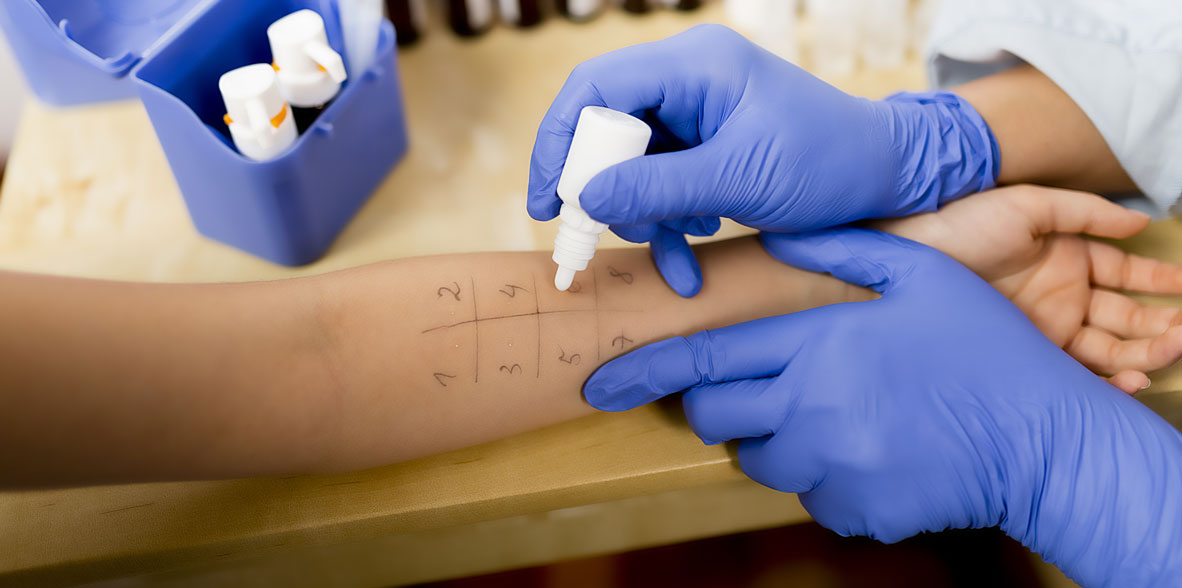

 Centro Médico Teknon
Centro Médico Teknon- Centro Médico Teknon
- Centro Médico Teknon
- Centro Médico Teknon
What are drug allergies?
In developed countries, the consumption of drugs is extremely frequent and the access to new active and safe drugs means a great advance in the fight against most diseases. However, in some cases, their consumption brings with it the development of adverse drug reactions, i.e., undesirable effects that may be due to different causes. Among these, hypersensitivity reactions known as "drug allergies" (DA) occupy a prominent place.
Allergy to a given drug is always due to an immunological phenomenon in which the drug behaves like an allergen. When it reacts with the individual's antibodies or sensitized cells, it causes a more or less severe clinical manifestation.
Immediate reactions mediated by IgE antibodies are the most life-threatening, as anaphylactic reactions and anaphylactic shock are not uncommon. There are other reactions of later onset that can also be severe: vasculitis, serum sickness or fever, among others.
- Which drugs can cause allergy?
The drugs responsible for most reactions are antibiotics, mainly beta-lactams (penicillin, amoxicillin, cephalosporins), macrolides (erythromycin, clarithromycin, azithromycin and others) and quinolones (ciprofloxacin, ofloxacin and others). The sulfonamides, less used today, have been a group that generates allergies; however, it should be remembered that cotrimoxazole (trimethoprim+sulfamethoxazole) still has important therapeutic indications.
Another group of drugs responsible for drug allergies are the non-steroidal anti-inflammatory drugs or NSAIDs, which include a large number of drugs with analgesic and anti-inflammatory activity such as aspirin, ibuprofen, diclofenac (Voltaren), piroxicam (Feldene) and many others.
Local anesthetics, muscle relaxants, neuroleptics (droperidol), antineoplastic chemotherapeutics, antiretrovirals, hormones, vitamins and local corticosteroids themselves are implicated in some allergic reactions. Virtually any drug could cause an allergic reaction.
- How does drug allergy manifest itself?
Allergic drug reactions are characterized by appearing within a few minutes to a few hours after receiving the drug that has sensitized the patient. A first contact is always necessary, which usually does not cause any disturbance, but is essential for the sensitization process.
The most common reaction is the development of localized or generalized urticaria, with swelling (edema) of the lips, eyelids or other areas, sometimes very noticeable. Other manifestations are rashes of other characteristics, fixed on extremities and genitals that are repeated when taking the same drug, and much more serious conditions such as erythema exudative multiforme or toxic epidermal necrolysis.
Locally applied drugs (neomycin, corticosteroids, phenothiazine antihistamines, etc.) can cause eczematous eruptions, photosensitivity and others.
Highly sensitized patients, especially if they receive the drug by injection, may develop immediate multisystemic involvement (anaphylaxis) and even go into shock.
- How is drug allergy diagnosed?
Once the specific and exhaustive clinical history has been taken, which is essential in these cases, it will be determined whether the patient suffers from another type of allergy and an analysis will be requested in search of specific allergy markers. In the case of beta-lactams and some other drugs, the existence of specific IgE antibodies or specifically sensitized cells will be determined by means of specialized analysis.
In most cases, in vivo tests must be performed to confirm the diagnosis. These tests can be performed on the patient's skin or completed by means of a controlled progressive challenge test. In this case, the tests must be performed under strict medical supervision and in a hospital setting, as they involve a risk to the patient's health, who must be duly informed and asked to agree to the test. - What is the treatment of drug allergy?
Once the diagnosis is established, the patient should be advised not to use the drugs involved in the reaction, substitutes should be sought by tolerance testing and appropriate intervention guidelines should be indicated in case a related drug is inadvertently administered.
In cases of risk of severe reactions, the patient should be taught to administer self-injectable adrenaline and to use appropriate doses of antihistamines and corticosteroids while going to the emergency department.



































